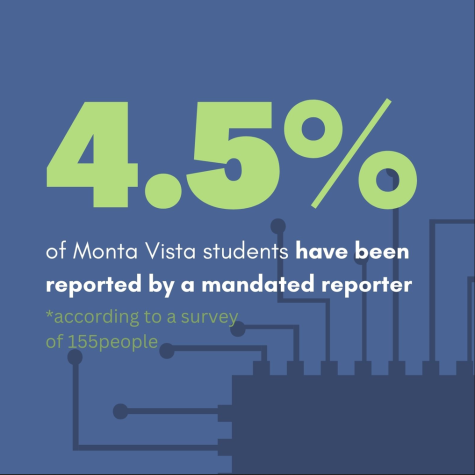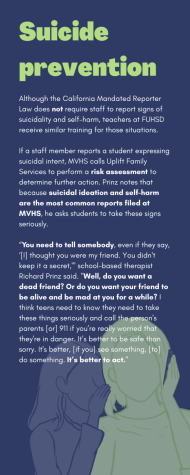Mandated reporters share their experiences
State law requires MVHS staff to prioritize student safety over privacy
October 7, 2022
Trigger warning: The story contains discussions of child abuse and suicidal ideation.
Every school employee, from teachers to custodial staff to administration, is a mandated reporter. If they have “reasonable suspicion” that a student is suffering from abuse or neglect, they are legally obligated to inform local child protective services, the local police department or both.

School faculty are required to complete mandated reporting training every year within the first six weeks of school, consisting of an online course describing the responsibilities of a mandated reporter and a test at the end. The course includes various case studies focusing on the indicators of abuse in various situations, such as physical signs like bruises and wounds, indicators of neglect such as frequent hunger or unkempt clothes and emotional signs like avoiding specific people or displaying emotional distress.
According to school-based therapist Richard Prinz, concrete evidence is not required to file a report. He states that a reporter is “not an investigator” and that they “don’t ask a lot of questions if they see signs of abuse or [if] somebody reports it to them.”
Mandated reporter and suicide prevention trainings are 36 and 39-minute long online courses respectively. School psychologist Annie Maness says the training gives teachers an appropriate understanding of the signs that warrant a report.
“I think [the training is] a great informational [resource] that will put [teachers on] the right path,” Maness said. “I think it would be really hard to teach them all the things that are required of mandated reporting because that’s not their expertise, but I think [the training] gives them the amount of information they need to start and then find the right professionals to continue.”
Reports of child abuse or neglect start with making a phone call to child protective services. The reporter is required to turn in a written report within 36 hours of the phone call. Failure to do so could result in fines of up to $1,000 or jail time of up to six months. School counselor Clay Stiver says that once the mandated reporter files a case, they are often no longer involved in the situation.

“Sometimes, I will get a letter from CPS, and they will tell me what happened with the case and [if a case is closed],” Stiver says. “Sometimes I will get a call from the social worker, and [we] collaborate. [That] probably happened a couple of times. Sometimes I don’t hear anything.”
Stiver attributes the sporadic communication between CPS and mandated reporters to CPS being understaffed. However, he has worked closely with social workers to resolve some cases and believes a collaborative environment benefits families and students. Maness adds that sustaining open communication between herself and the student while making a report makes the reporting process easier for students and families.
Maness, who has worked in positions that require her to be a mandated reporter in other states, also says that considering the students’ environmental “stressors,” such as poverty, is important when making a report. Additionally, Stiver thinks that keeping a student’s culture in mind is essential but also stresses the importance of following the law.
“Sometimes parents need to learn that [it is] still not OK [even if an escalation is] cultural,” Stiver said. “[The] parents grew up in a different country [and] this is what [they] learned. And then they come to a new country [where the] laws are different, things are different, parenting styles are different, and it’s just more of a learning lesson [for them].”
Prinz emphasizes that ultimately, mandated reporting exists to benefit students. Although some reports may worsen the situation for the student in the short term, Prinz believes it helps students and families in the long run.
“I think it’s a long process,” Prinz said. “But it does stop the abuse and [makes] people [realize] that there are witnesses — there are people paying attention [to] how you treat each other. I’ve seen situations where it did change relations between parent and child over time. So I think it does more good than harm.”
*Correction (10/12/2022, 10:00 a.m.): Edits made regarding the time frame in which a reporter must file their report after calling CPS or the police. Originally what was stated was that the time frame is 48 hours. This error has been corrected to state that the time frame in which a reporter must file a written report after calling CPS or the police is 36 hours.




























